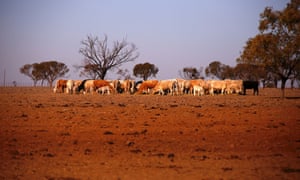Exclusive: Australia needs the expertise to predict changes which have a major impact across the country, a review finds
A government-backed review of Australia’s climate science capability has identified “critical gaps” in the nation’s ability to understand the processes that underpin climate change, with atmospheric modelling lagging other countries.
It found Australia was in danger of losing “critical expertise” needed to predict changes in major climate patterns, such as El Niño and the Indian Ocean Dipole, that have a major impact across the continent.
On atmospheric modelling, it found research had fallen “well behind those that lead the world”, partly because of a “lack of computational power and data storage”.
The report, seen by Guardian Australia and expected to be released this week, was requested by the government-appointed National Climate Science Advisory Committee to help develop a strategy in the area.
It was co-ordinated by the Centre of Excellence for Climate Extremes (Clex), and finalised after a workshop and survey of researchers at academic institutions and government agencies.It found Australia was in danger of losing “critical expertise” needed to predict changes in major climate patterns, such as El Niño and the Indian Ocean Dipole, that have a major impact across the continent.
On atmospheric modelling, it found research had fallen “well behind those that lead the world”, partly because of a “lack of computational power and data storage”.
The report, seen by Guardian Australia and expected to be released this week, was requested by the government-appointed National Climate Science Advisory Committee to help develop a strategy in the area.
It concluded the research effort across Australia was substantial, including a “very strong, world-leading effort” in observing the oceans. But while the country had a good foundation of research, coordination was lacking.
The survey found there were 466 full-time equivalent staff and students dedicated to investigating climate processes, but there was a “sub-critical mass” of research into aspects of atmospheric physics that were integral to phenomena like heatwaves and the cycle of El Niño and La Nina, a natural cycle that can have major influence on Australian rainfall and heat.
The report said: “The loss of expertise in these areas represents a critical threat to Australia’s ability to understand and predict such phenomena into the future. The shortage of expertise in these areas requires urgent correction.”
It said there was also evidence efforts to develop climate models were “approaching critical thresholds of under-resourcing and capacity limits”. While Australia was putting a “significant effort” into understanding the processes of the cryosphere – parts of the planet covered in ice – the efforts were fragmented.
In a summary, the report says: “The report concludes that a transformation of climate processes research into a community working collectively towards national goals in a common science framework is essential.
“Given the underpinning role of processes research for all other climate research this transformation provides the foundation for providing solutions to the climate-related societal challenges ahead.”
To combat the issues, the report suggested a “community-wide research network” be created, and short-term “accelerator institutes” funded to tackle key knowledge gaps.
In 2017, the Australian Academy of Science issued a report into Australia’s climate science capability that also identified risks. It said the team developing Australia’s weather and modelling system – Australian Community Climate and Earth System Simulator (Access) – was a “small fraction of the size of groups building equivalent models for their regions in other countries”.
The report was requested by the National Climate Science Advisory Committee, which itself issued a report in June 2019 that was not made publicly available until 19 December 2019.
A Department of Agriculture, Water and the Environment spokesman said the report was commissioned by the environment minister, Sussan Ley, and the science minister, Karen Andrews, after they received recommendations from the National Climate Science Advisory Committee.
He said it would “help ensure the government’s climate science activities are better coordinated and prioritised to maintain and strengthen Australia’s climate research capability”.
“The government is committed to climate science investment and is progressing the establishment of an enhanced climate science advisory group that will build on the work of the National Climate Science Advisory Committee to ensure that Australian decision makers have continued access to world class scientific information,” the spokesman said.
.png)

No comments:
Post a Comment